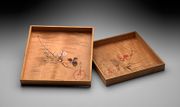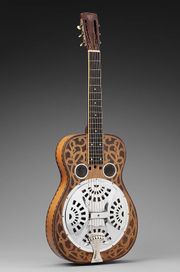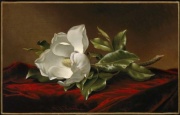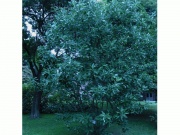Difference between revisions of "Magnolia"
Jump to navigation
Jump to search
m (Text replace - "== Authority ==" to "== Sources Checked for Data in Record ==") |
|||
| (15 intermediate revisions by the same user not shown) | |||
| Line 1: | Line 1: | ||
| − | [[File: | + | [[File:Magnolia box MFA.jpg|thumb|Magnolia box<br> MFA# 2015.968.1-2]] |
| + | [[File:Magnolia guitar MFA.jpg|thumb|Magnolia guitar<br>MFA# 2006.1883]] | ||
| + | [[File:Image3_802581.jpg|thumb|Magnolia flower by Heade: MFA# 47.1169]] | ||
== Description == | == Description == | ||
| − | A large family of ornamental, evergreen trees of the genus Magnolia, such as ''Magnolia grandiflora'', that is native to Central and North America. Magnolia | + | A large family of ornamental, evergreen trees of the genus Magnolia, such as ''Magnolia grandiflora'', that is native to Central and North America. Magnolia trees are frequently used in cultivation for their evergreen leaves and their magnificent early spring blooms. The trees produce a heavy, durable wood (often sold as yellow pine) that is used for boxes, furniture, and millwork. Additionally, the flowers are considered edible. |
| + | [[File:magnoliacm.jpg|thumb|Magnolia tree (''Magnolia virginiana'')]] | ||
| + | See also [[https://cameo.mfa.org/wiki/Category:Uemura_dye_archive '''Uemera Dye Archive''' (Mokuren)]] | ||
== Synonyms and Related Terms == | == Synonyms and Related Terms == | ||
| − | laurel; sweet bay; southern magnolia (Magnolia grandiflora); bull bay; Magnolien (Deut.); Magnolie (Dan.); Magnolia (Esp., Fr., It., Ned., Sven.); Magnólia (Port.) | + | laurel; sweet bay; southern magnolia ''(Magnolia grandiflora''); bull bay; Magnolien (Deut.); Magnolie (Dan.); Magnolia (Esp., Fr., It., Ned., Sven.); Magnólia (Port.) |
| − | + | == Physical and Chemical Properties == | |
| − | == | ||
| − | Medium tree growing to 25 m with | + | * Medium tree growing to 25 m with pyramidal crown. |
| − | + | * Bark = brown with flat plates or scales. | |
| − | + | * Leaves = oval (8-12 cm) and pinnately veined, waxy top surface. | |
| − | + | * Fruit = aggregate of follicles turning red when mature in fall. | |
| − | + | * Wood density = 35 pcf | |
| − | + | * Wide sapwood is creamy white to grayish; narrow heartwood is medium to dark brown | |
| − | + | * Grain is straight; texture is a uniform fine to medium | |
| + | * Susceptible to insects and decay | ||
== Additional Images == | == Additional Images == | ||
<gallery> | <gallery> | ||
| − | File: | + | File:Uemura 09-10-2009 298.jpg|Silk dyed with Magnolia bark; Uemera Dye Archive |
File:37_Magnolia.jpg|Magnolia (''Magnolia grandiflora'') | File:37_Magnolia.jpg|Magnolia (''Magnolia grandiflora'') | ||
File:72_Magnolia_100X_Rad.jpg|Magnolia (''Magnolia grandiflora'') | File:72_Magnolia_100X_Rad.jpg|Magnolia (''Magnolia grandiflora'') | ||
| Line 28: | Line 32: | ||
</gallery> | </gallery> | ||
| − | + | ==Working Properties== | |
| − | == | + | * Easy to work with both hand and machine tools. |
| − | + | * Turns, glues, stains, and finishes well. | |
| − | * | + | == Resources and Citations == |
| − | + | * The Wood Database: [https://www.wood-database.com/southern-magnolia/ Southern magnolia] | |
| − | * ''Encyclopedia Britannica'', http://www.britannica.com Comment: "magnolia." | + | * Hardwood Manufacturers Institute, Memphis, Tenn.: air-dry weight = 35 pcf |
| − | + | * ''Encyclopedia Britannica'', http://www.britannica.com Comment: "magnolia." 19 Oct. 2004 . | |
* Edward Reich, Carlton J. Siegler, ''Consumer Goods: How to Know and Use Them'', American Book Company, New York City, 1937 | * Edward Reich, Carlton J. Siegler, ''Consumer Goods: How to Know and Use Them'', American Book Company, New York City, 1937 | ||
| − | + | * Virginia Tech Dendrology website at www.fw.vt.edu/dendro/dendrology/main.htm (accessed Oct. 8, 2005) | |
| − | * | + | * Wikipedia: [https://en.wikipedia.org/wiki/Magnolia Magnolia] (accessed Dec. 15, 2004 and October 2024) |
| − | |||
| − | * Wikipedia | ||
| − | [[Category:Materials database]] | + | [[Category:Materials database]][[Category:MWG]][[Category: Wood]] |
Latest revision as of 11:05, 3 October 2024
Description
A large family of ornamental, evergreen trees of the genus Magnolia, such as Magnolia grandiflora, that is native to Central and North America. Magnolia trees are frequently used in cultivation for their evergreen leaves and their magnificent early spring blooms. The trees produce a heavy, durable wood (often sold as yellow pine) that is used for boxes, furniture, and millwork. Additionally, the flowers are considered edible.
See also [Uemera Dye Archive (Mokuren)]
Synonyms and Related Terms
laurel; sweet bay; southern magnolia (Magnolia grandiflora); bull bay; Magnolien (Deut.); Magnolie (Dan.); Magnolia (Esp., Fr., It., Ned., Sven.); Magnólia (Port.)
Physical and Chemical Properties
- Medium tree growing to 25 m with pyramidal crown.
- Bark = brown with flat plates or scales.
- Leaves = oval (8-12 cm) and pinnately veined, waxy top surface.
- Fruit = aggregate of follicles turning red when mature in fall.
- Wood density = 35 pcf
- Wide sapwood is creamy white to grayish; narrow heartwood is medium to dark brown
- Grain is straight; texture is a uniform fine to medium
- Susceptible to insects and decay
Additional Images
Working Properties
- Easy to work with both hand and machine tools.
- Turns, glues, stains, and finishes well.
Resources and Citations
- The Wood Database: Southern magnolia
- Hardwood Manufacturers Institute, Memphis, Tenn.: air-dry weight = 35 pcf
- Encyclopedia Britannica, http://www.britannica.com Comment: "magnolia." 19 Oct. 2004 .
- Edward Reich, Carlton J. Siegler, Consumer Goods: How to Know and Use Them, American Book Company, New York City, 1937
- Virginia Tech Dendrology website at www.fw.vt.edu/dendro/dendrology/main.htm (accessed Oct. 8, 2005)
- Wikipedia: Magnolia (accessed Dec. 15, 2004 and October 2024)







